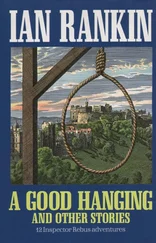Nelson scowled. “I think you done got us lost,” he said.
Mr. Head swung around sharply and looked for the dome. It was nowhere in sight. “I ain’t got us lost either,” he said. “You’re just tired of walking.”
“I ain’t tired, I’m hungry,” Nelson said. “Give me a biscuit.”
They discovered then that they had lost the lunch.
“You were the one holding the sack,” Nelson said. “I would have kepaholt of it.”
“If you want to direct this trip, I’ll go on by myself and leave you right here,” Mr. Head said and was pleased to see the boy turn white. However, he realized they were lost and drifting farther every minute from the station. He was hungry himself and beginning to be thirsty and since they had been in the colored neighborhood, they had both begun to sweat. Nelson had on his shoes and he was unaccustomed to them. The concrete sidewalks were very hard. They both wanted to find a place to sit down but this was impossible and they kept on walking, the boy muttering under his breath, “First you lost the sack and then you lost the way,” and Mr. Head growling from time to time, “Anybody wants to be from this nigger heaven can be from it!”
By now the sun was well forward in the sky. The odor of dinners cooking drifted out to them. The Negroes were all at their doors to see them pass. “Whyn’t you ast one of these niggers the way?” Nelson said. “You got us lost.”
“This is where you were born,” Mr. Head said. “You can ast one yourself if you want to.”
Nelson was afraid of the colored men and he didn’t want to be laughed at by the colored children. Up ahead he saw a large colored woman leaning in a doorway that opened onto the sidewalk. Her hair stood straight out from her head for about four inches all around and she was resting on bare brown feet that turned pink at the sides. She had on a pink dress that showed her exact shape. As they came abreast of her, she lazily lifted one hand to her head and her fingers disappeared into her hair.
Nelson stopped. He felt his breath drawn up by the woman’s dark eyes. “How do you get back to town?” he said in a voice that did not sound like his own.
After a minute she said, “You in town now,” in a rich low tone that made Nelson feel as if a cool spray had been turned on him.
“How do you get back to the train?” he said in the same reed-like voice.
“You can catch you a car,” she said.
He understood she was making fun of him but he was too paralyzed even to scowl. He stood drinking in every detail of her. His eyes traveled up from her great knees to her forehead and then made a triangular path from the glistening sweat on her neck down and across her tremendous bosom and over her bare arm back to where her fingers lay hidden in her hair. He suddenly wanted ner to reach down and pick him up and draw him against her and then he wanted to feel her breath on his face. He wanted to look down and down into her eyes while she held him tighter and tighter. He had never had such a feeling before. He felt as if he were reeling down through a pitchblack tunnel.
“You can go a block down yonder and catch you a car take you to the railroad station, Sugarpie,” she said.
Nelson would have collapsed at her feet if Mr. Head had not pulled him roughly away. “You act like you don’t have any sense!” the old man growled.
They hurried down the street and Nelson did not look back at the woman. He pushed his hat sharply forward over his face which was already burning with shame. The sneering ghost he had seen in the train window and all the foreboding feelings he had on the way returned to him and he remembered that his ticket from the scale had said to beware of dark women and that his grandfather’s had said he was upright and brave. He took hold of the old man’s hand, a sign of dependence that he seldom showed.
They headed down the street toward the car tracks where a long yellow rattling trolley was coming. Mr. Head had never boarded a streetcar and he let that one pass. Nelson was silent. From time to time his mouth trembled slightly but his grandfather, occupied with his own problems, paid him no attention. They stood on the corner and neither looked at the Negroes who were passing, going about their business just as if they had been white, except that most of them stopped and eyed Mr. Head and Nelson. It occurred to Mr. Head that since the streetcar ran on tracks, they could simply follow the tracks. He gave Nelson a slight push and explained that they would follow the tracks on into the railroad station, walking, and they set off.
Presently to their great relief they began to see white people again and Nelson sat down on the sidewalk against the wall of a building. “I got to rest myself some,” he said. “You lost the sack and the direction. You can just wait on me to rest myself.”
“There’s the tracks in front of us,” Mr. Head said. “All we got to do is keep them in sight and you could have remembered the sack as good as me. This is where you were born. This is your old home town. This is your second trip. You ought to know how to do,” and he squatted down and continued in this vein but the boy, easing his burning feet out of his shoes, did not answer.
“And standing there grinning like a chim-pan-zee while a nigger woman gives you directions. Great Gawd!” Mr. Head said.
“I never said I was nothing but born here,” the boy said in a shaky voice. “I never said I would or wouldn’t like it. I never said I wanted to come. I only said I was born here and I never had nothing to do with that. I want to go home. I never wanted to come in the first place. It was all your big idea. How you know you ain’t following the tracks in the wrong direction?”
This last had occurred to Mr. Head too. “All these people are white,” he said.
“We ain’t passed here before,” Nelson said. This was a neighborhood of brick buildings that might have been lived in or might not. A few empty automobiles were parked along the curb and there was an occasional passerby. The heat of the pavement came up through Nelson’s thin suit. His eyelids began to droop, and after a few minutes his head tilted forward. His shoulders twitched once or twice and then he fell over on his side and lay sprawled in an exhausted fit of sleep.
Mr. Head watched him silently. He was very tired himself but they could not both sleep at the same time and he could not have slept anyway because he did not know where he was. In a few minutes Nelson would wake up, refreshed by his sleep and very cocky, and would begin complaining that he had lost the sack and the way. You’d have a mighty sorry time if I wasn’t here, Mr. Head thought; and then another idea occurred to him. He looked at the sprawled figure for several minutes; presently he stood up. He justified what he was going to do on the grounds that it is sometimes necessary to teach a child a lesson he won’t forget, particularly when the child is always reasserting his position with some new impudence. He walked without a sound to the corner about twenty feet away and sat down on a covered garbage can in the alley where he could look out and watch Nelson wake up alone.
The boy was dozing fitfully, half conscious of vague noises and black forms moving up from some dark part of him into the light. His face worked in his sleep and he had pulled his knees up under his chin. The sun shed a dull dry light on the narrow street; everything looked like exactly what it was. After a while Mr. Head, hunched like an old monkey on the garbage can lid, decided that if Nelson didn’t wake up soon, he would make a loud noise by bamming his foot against the can. He looked at his watch and discovered that it was two o’clock. Their train left at six and the possibility of missing it was too awful for him to think of. He kicked his foot backwards on the can and a hollow boom reverberated in the alley.
Читать дальше









